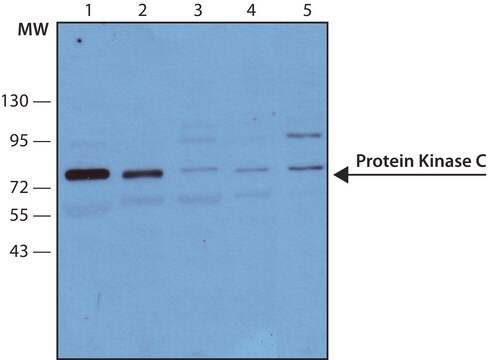SBVT06
SB-MRP3-Sf9
membrane preparation for Vesicular Transport Assays, recombinant, expressed in baculovirus infected Sf9 cells
Synonym(s):
ABCC3, MRP3, MRP3 human membrane vesicles, Multidrug resistance associated protein 3
Sign Into View Organizational & Contract Pricing
All Photos(1)
About This Item
UNSPSC Code:
12352200
Recommended Products
recombinant
expressed in baculovirus infected Sf9 cells
form
liquid
concentration
5 mg/mL
color
off-white
UniProt accession no.
shipped in
dry ice
storage temp.
−70°C
Gene Information
human ... ABCC3(8714)
General description
Membrane Preparations for Vesicular Transport Assays (VT) are suitable for general drug-efflux transporter interaction studies. Both substrate and inhibitor interactions can be assessed using vesicles. The success of substrate interaction studies strongly depends on the passive permeability of the compound. High permeability substrates might not be detected. Control Membranes with no-, or significantly lower transporter activity are also available.
Application
In the vesicular transport assay so-called "inside-out" membrane vesicles containing ABC transporters are applied. Incubating substrates of the respective efflux transporter in the presence of the inverted membrane vesicles and ATP will allow measuring accumulation of the substrates into the vesicles. In many cases radiolabeled reporter substrates are used but recently SOLVO developed the new PREDIVEZ Vesicular Transport Kits that use fluorescent reporter substrates.
The standard vesicular transport assay is an inhibitory assay performed with cold test articles. This assay provides information on any interaction between the ABC transporter and the test article. The transport of the reporter substrate is measured in the presence of the test article (typically in 7 concentrations) and IC50 is defined as the concentration inhibiting the transport of the reporter substrate by 50%.
Should radiolabeled form of the investigated compound or adequate analytical methods (LC/MS, HPLC) be available, the vesicular transport assay may be performed in a direct format without the reporter substrate and may identify substrate nature of the test article. The vesicular transport substrate assay is a low throughput assay. It is suitable for low permeability test compounds as high permeability compounds may escape from the vesicles through the lipid bilayer.
PREDIVEZ vesicular transport kit is sold separately. This transporter membrane vesicle assay requires the PREDIVEZ vesicular transport kit and corresponding control membrane below:
SB PREDIVEZ Reagent Kit for MRP2, MRP3, and MRP5 part number SBPVR3-9RXN and corresponding control membrane SB-beta-gal-Sf9-CTRL part number SBCT03-1EA
The standard vesicular transport assay is an inhibitory assay performed with cold test articles. This assay provides information on any interaction between the ABC transporter and the test article. The transport of the reporter substrate is measured in the presence of the test article (typically in 7 concentrations) and IC50 is defined as the concentration inhibiting the transport of the reporter substrate by 50%.
Should radiolabeled form of the investigated compound or adequate analytical methods (LC/MS, HPLC) be available, the vesicular transport assay may be performed in a direct format without the reporter substrate and may identify substrate nature of the test article. The vesicular transport substrate assay is a low throughput assay. It is suitable for low permeability test compounds as high permeability compounds may escape from the vesicles through the lipid bilayer.
PREDIVEZ vesicular transport kit is sold separately. This transporter membrane vesicle assay requires the PREDIVEZ vesicular transport kit and corresponding control membrane below:
SB PREDIVEZ Reagent Kit for MRP2, MRP3, and MRP5 part number SBPVR3-9RXN and corresponding control membrane SB-beta-gal-Sf9-CTRL part number SBCT03-1EA
Physical form
Supplied as frozen membrane vesicles, containing 5 mg/ml membrane protein, labeled with volume, catalog number (transporter) and date of production.
Legal Information
Distributed for SOLVO Biotechnology, Inc.
related product
Product No.
Description
Pricing
Storage Class Code
12 - Non Combustible Liquids
WGK
WGK 1
Flash Point(F)
Not applicable
Flash Point(C)
Not applicable
Certificates of Analysis (COA)
Search for Certificates of Analysis (COA) by entering the products Lot/Batch Number. Lot and Batch Numbers can be found on a product’s label following the words ‘Lot’ or ‘Batch’.
Already Own This Product?
Find documentation for the products that you have recently purchased in the Document Library.
Expression of the multidrug resistance proteins MRP2 and MRP3 in human cholangiocellular carcinomas.
S Rau et al.
European journal of clinical investigation, 38(2), 134-142 (2008-01-30)
Cholangiocellular carcinomas and gallbladder carcinomas are highly aggressive tumours with a poor prognosis and are generally regarded as chemoresistant tumours. Overexpression of ATP-binding cassette transporters of the multidrug resistance protein (MDR) and multidrug resistance-related protein (MRP) family in cancer cells
T Hirohashi et al.
The Journal of pharmacology and experimental therapeutics, 292(1), 265-270 (1999-12-22)
Several organic anions are actively extruded from intestinal epithelial cells into the lumen and vascular sides. To examine the role of the multidrug resistance-associated protein (MRP) family in the intestinal efflux of organic anions, the function and expression of these
Koen van de Wetering et al.
Gastroenterology, 137(5), 1725-1735 (2009-07-07)
The physiologic function of the efflux transporter Multidrug Resistance Protein 3 (MRP3) remains poorly defined. In vitro, MRP3 transports several glucuronidated compounds, but the compounds transported under physiologic conditions are unknown. Knowledge of the compounds transported by MRP3 in vivo
George L Scheffer et al.
Laboratory investigation; a journal of technical methods and pathology, 82(2), 193-201 (2002-02-19)
The multidrug resistance protein (MRP) family consists of several members and, for some of these transporter proteins, distinct roles in multidrug resistance and normal tissue functions have been well established (MRP1 and MRP2) or are still under investigation (MRP3). MRP3
Laura Partanen et al.
Genes, chromosomes & cancer, 51(9), 832-840 (2012-05-16)
The ATP-binding cassette (ABC) of active transporters comprises a group of proteins that which facilitate efflux of anticancer drugs from cancer cells. We focused on the gene amplification and protein expression of ABCC3 (also known as MRP3) in breast cancer
Our team of scientists has experience in all areas of research including Life Science, Material Science, Chemical Synthesis, Chromatography, Analytical and many others.
Contact Technical Service


